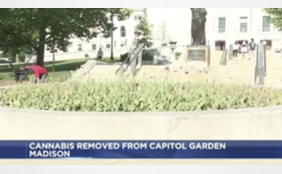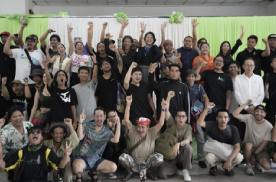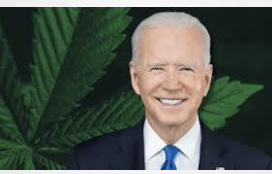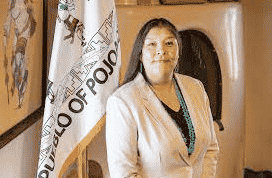They write
For years, as conversations and debates in Congress and state legislatures about legalizing cannabis took place, an often overlooked piece of the puzzle was what legalization meant for tribal governments.
In most states that have legalized recreational-use cannabis, state governments have entered into agreements with sovereign nations, allowing tribes to set up their own cannabis programs. New Mexico recently signed on to two of those kinds of agreements, which allows both the Picuris and Pojoaque pueblos to grow and sell cannabis, which will presumably deter federal officials from intervening.
Pojoaque Governor Janelle Roybal told Growing Forward, the collaborative cannabis podcast between NM Political Report and New Mexico PBS, that she and other tribal leaders were excited to sign the intergovernmental agreement with the state because it gives Pojoaque autonomy to regulate cannabis sales and see direct financial benefits.
“For us, it gives us the opportunity under the agreement to have all regulatory authority for any dispensaries or even grow operations within our exterior boundaries, meaning they can’t get approved for a state license unless they get approval through our cannabis commission prior to that. So it allows us to have that extra protection for our tribe and our community,” Roybal said.
Like many other tribal governments, Pojoaque’s physical boundaries are “checkerboarded,” meaning non-tribal land is surrounded by tribal land. Roybal said Pojoaque running its own independent cannabis program also allows the Pueblo to serve surrounding communities.
“We are checkerboarded, so our library, our wellness center, our senior center, all those are open to the community, they’re not just for our tribal members,” Roybal said. “So when we expand or grow in any of our departments, it’s helping everyone in the area. So this is for not just our Pueblo, but for the whole community.”
Pojoaque’s Lt. Gov. Rafaela Sanchez said although the Pueblo’s cannabis program is not limited to those with a medical cannabis card, the primary focus of the program is holistic.
“We really do look at it as a form of healing and wellness, and we want to bring that message across to the community, to the people,” Sanchez said. “That’s where we’re coming from. It’s not necessarily another recreational drug.”
But the path towards cannabis legalization for the Picuris Pueblo was a much longer and rockier one.
Almost a decade ago and just several years after New Mexico legalized medical cannabis, Picuris tried to set up its own medical cannabis program. But federal officials quickly warned Picuris that if the Pueblo continued to operate a medical cannabis program, it would face federal intervention, including raids.
Picuris Pueblo Gov. Craig Quanchello said that not only was this at odds with the idea of tribal sovereignty, but it also put non-tribal members who live on the Picuris Pueblo at risk of federal prosecution.
“We also have tribal members that are married to non-tribals that were at risk of possibly being arrested or whatever they were doing at the time. And also we do have a checkerboard reservation to where we have non-tribal members that live within our reservation,” Quanchello said.
That fact became evident recently when a man who lived on Picuris land but is not a member, had his entire personal use grow raided by Bureau of Indian Affairs agents. Neither that man, nor the Picuris Pueblo was ever federally charged, but Quanchello has a theory about why Picuris was targeted, while tribes in California, Nevada and Washington have successfully set up their own cannabis programs.
“I guess my theory would be that we’re not a big tribe, and we’re not politically strong. We’re not in the gaming business,” Quanchello said. “So maybe we’re being used as an example, basically, I don’t know.”
Both Picuris and Pojoaque are able to charge their own taxes and use that revenue where leaders see fit. Quanchello said cannabis tax revenue will go towards education, substance abuse prevention and behavioral health.
“If we make money, great. If we don’t make money, we still need to figure out how to be self-sustaining. Because our original goal was that holistic approach,” Quanchello said.
Like Roybal, Quanchello said the agreement with the state allows Picuris autonomy to regulate cannabis.
“The key points in this whole agreement is that it recognizes our government-to-government relationship, and also it recognizes our sovereignty,” Quanchello said.
Hear more about cannabis and the Picuris and Pojoaque pueblos by listening to the two episodes of Growing Forward below.
Listen to the podcasts at

















